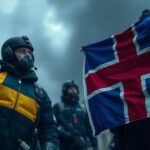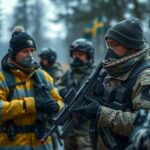Sweden and Finland: New Guidance for Wartime Survival Amid Rising Tensions
In response to rising tensions after Russia’s invasion of Ukraine, Sweden and Finland are providing their citizens with survival guidance. Sweden is distributing a booklet entitled “If Crisis or War Comes,” while Finland has published new emergency preparedness guidelines. This marks a significant shift away from their traditional neutrality towards a focus on national security and citizen readiness.
In a historical shift towards military preparedness, Sweden and Finland have abandoned their long-standing positions of neutrality in response to rising regional tensions exacerbated by Russia’s invasion of Ukraine. Both nations are proactively equipping their citizens with essential survival strategies in the event of wartime scenarios. Sweden is dispatching a comprehensive booklet, titled “If Crisis or War Comes,” to five million households within a two-week period, focusing on actionable advice for various crises. Similarly, Finnish authorities have introduced new guidelines aimed at preparing citizens for a range of emergencies, including extreme weather, extensive power outages, and potential military conflict, reflecting a growing commitment to national security.
Historically, Sweden and Finland adopted a neutral stance in global conflicts, emphasizing diplomacy over military involvement. However, the invasion of Ukraine by Russia has dramatically altered the security landscape in Europe. The subsequent application to join NATO by both nations signifies a paradigm shift in their defense policies. As tensions continue to mount in the region, preparing the populace for potential crises has become a priority for both governments, ensuring that citizens are informed and ready for emergencies.
In conclusion, Sweden and Finland have transitioned from neutrality to an emphasis on preparedness in light of escalating regional conflicts. By informing citizens through booklets and guidance, both nations seek to enhance public resilience and awareness in the face of potential wartime scenarios. This proactive approach underscores a collective determination to safeguard national security and empower individuals with the knowledge necessary to navigate crises effectively.
Original Source: www.washingtonpost.com








Post Comment